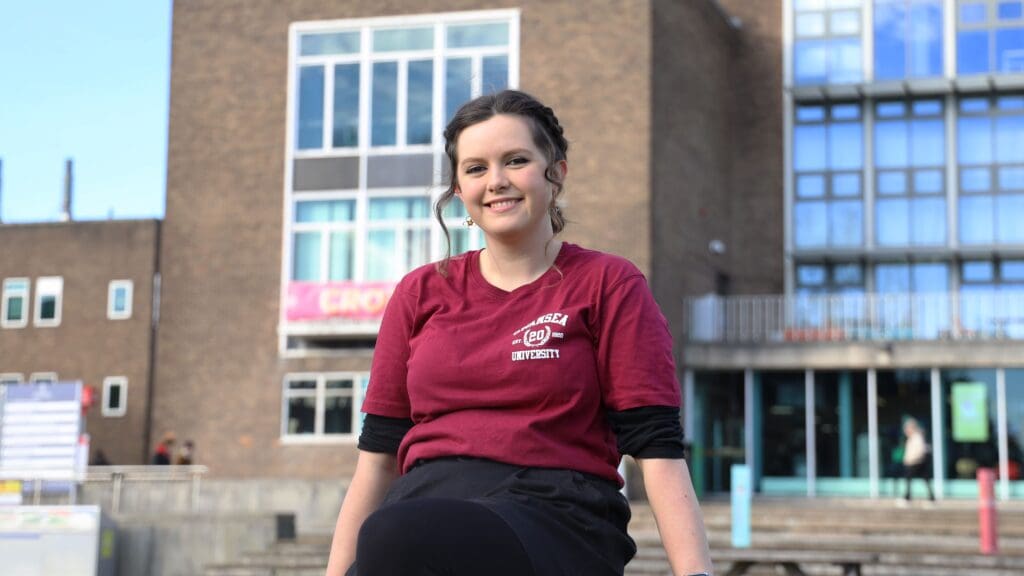The extraordinary success of students such as Caitlin Tanner who were the first in their families to attend university is being highlighted in a new national campaign, led by Universities UK.
Caitlin studied adult nursing at Swansea University’s Faculty of Medicine, Health and Life Science and graduated with first class honours. She was the first in her family to attend university and went on to spend three years studying part-time for an MA in education for health professionals while working as a nurse at Morriston Hospital’s ITU during the pandemic.
Born with bilateral profound deafness, Caitlin had cochlear implant surgery during her A-levels studies in 2016. It was the way she was cared for by doctors and nurses during her treatment that inspired her to go into healthcare.
And her education continues. She is now studying for a PhD in nursing at the University, researching the experiences of deaf nurses in the UK.
She said: “University has had a huge impact on my life as I feel it has set me on a great path to help other people. For example, I qualified as a registered general nurse, and I realised there were gaps in knowledge of deaf people’s needs.
“I feel fortunate to be in a knowledgeable and change-making position that can positively improve other people’s experiences. Not only am I helping patients, but I am also actively engaged in researching how to make the clinical environment better suited for staff nurses who have hearing loss or develop it throughout their careers—since age-related hearing loss can affect staff.”
- UUK’s 100 Faces campaign aims to champion and celebrate the positive impact of ‘first-in-the-family’ (FitF) graduates on the UK to highlight the need for access to support, and ensure the next generation can reach their graduate potential;
- As part of the campaign, new research reveals the transformative impact of going to university on ambition (74 per cent), with almost three quarters (73 per cent) of FitF students agreeing their degree gave them the confidence to apply for jobs without feeling like an imposter;
- The research also highlights FiF students’ reliance on depreciating financial support – without financial support, more than 4 in 10 FitF graduates could not have afforded to go to university at all; and,
- With financial provisions dwindling and the cost of living rising, UUK is calling for government to reinstate maintenance grants and increase support for future students
These findings come from extensive new research, commissioned by Universities UK, into the experiences of 6,004 UK graduates and 4,006 non-graduates, aged 24 to 40, from across the UK.
The success of students like Caitlin is testament to the extraordinary role university can play – particularly for those students who are the first in their family to attend and face significant barriers before they even set foot on campus. Despite this inequality, FiF students flourish at university – with three quarters of FiF respondents saying that their experiences at university made them more confident and ambitious, gave them broader life experiences and crucial life skills which continue to be impactful long after graduation.
However, the research also pointed to the need for uplifted financial support to ensure that FiF students are able to progress. More than 4 in 10 (41 per cent) of FitF students believe that without financial assistance they wouldn’t have been able to afford to go to university, and when non-graduates from across the UK were asked what might have persuaded them to attend university, almost half (48 per cent) responded more financial support.
Many graduates responding to this survey were eligible for non-repayable maintenance grants as students, which were replaced by repayable loans, in England in 2016, although maintenance grants continue to operate in Wales, Scotland and for some healthcare courses in England.
In light of this, UUK is campaigning to highlight the achievements of the extraordinary first in family graduates in every community, and to ensure that future generations don’t miss out on the transformative impact of a university education.
Vivienne Stern MBE, Chief Executive of Universities UK, said: “There are those who say that too many people go to university. I disagree. These stories tell you why. In this country you are still twice as likely to go to university if you are from the wealthiest background, compared to the least wealthy. That’s not right.
“I believe we have a responsibility to keep working to ensure a wider range of people in this country get access to the potentially transformative experience of going to university. For that to happen, we really do need to see an improvement in maintenance support to support those from the least privileged backgrounds.”

